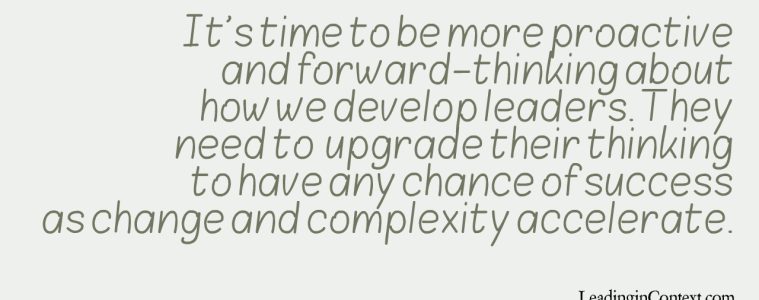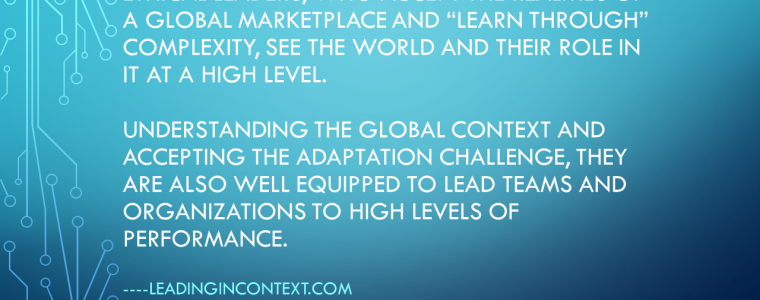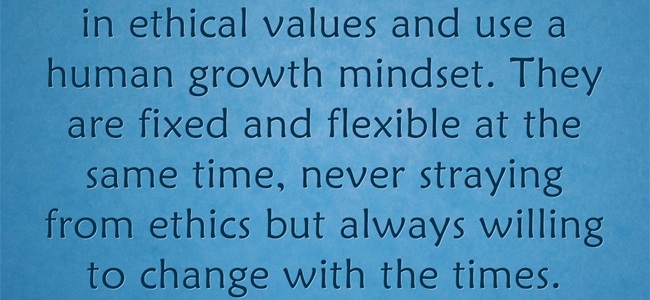By Linda Fisher Thornton Since moral growth is a lifelong pursuit, moral education needs to start early, and it needs to continue throughout our professional careers. This requires quite a bit more effort than just doing an "annual ethics training." Since ethical leadership itself is multidimensional and nuanced, any ethical leadership development for leaders must be multifaceted and nuanced.
Tag: ethics
Ethical Leadership Development: High Level View
By Linda Fisher Thornton What is Ethical Leadership Development? Ethical leadership development is the ongoing process of guiding leaders to become ethical people and ethical leaders. It is not the same thing as compliance training or following legal requirements, although those are also important. This is the human development that happens over time to bring leaders to the point of being able to handle what the world throws at them using ethical thinking and action. The way we develop leaders impacts their growth and readiness to make successful and ethical choices when faced with challenging situations.
10 Quotes to Inspire Leaders in 2024 (Part 1)
By Linda Fisher Thornton This series includes 10 quotes (linked to blog posts with leadership guidance) to inspire you and help you improve your leader development as we head into the new year. Part 1 includes the first 5.
Hallmarks of Ethical Leadership (Part 5)
By Linda Fisher Thornton In Part 5 of this series on attributes of ethical leadership, I explore the importance of really hearing all stakeholders, including those who are not in the room. Here are Part 1, Part 2, Part 3, and Part 4 in case you missed them.
Hallmarks of Ethical Leadership (Part 4)
By Linda Fisher Thornton This post is Part 4 in a series. In Part 1, Part 2, and Part 3 I explored 9 different traits that help you recognize ethical leaders. In Part 4 I will address the importance of leading in ways that eliminate fear. One of the hallmarks of ethical leadership is that it is a fear-free zone. Fear is insidious. It changes how we see the world and how we treat others. Here are 5 important reasons why fear has no place in our workplaces, our families or our communities:
Ethical Thinking and Decision Making for Leaders (Part 5)
By Linda Fisher Thornton While change is a constant reality, it doesn’t always factor into leadership thinking. In Part 1 and Part 2 of this series, I explored the Depth of our thinking, and the importance of understanding Context. In Part 3 and Part 4, I looked at embracing Complexity and the importance of full Inclusion. In Part 5, I’ll describe how embracing Change helps us make ethical decisions.
Building an Ethical Culture (Part 5)
By Linda Fisher Thornton Leaders are in a unique position to make ethics a priority through their everyday actions, but simply modeling ethics isn’t nearly enough. Here is a starting list of 5 actions leaders can take that move organizations toward an ethical culture, besides telling people how important ethics is and demonstrating it in everyday behavior and choices.
Building an Ethical Culture (Part 4)
By Linda Fisher Thornton Ethical Culture is a System of Systems Don’t assume that an ethical culture will just happen in your workplace. Even if you are a good leader, ethical culture is a delicate thing, requiring intentional positive leadership and daily tending. It requires more than good leadership, more than trust building, and more than good hiring. Why does building an ethical culture require so much more than good leadership? Ethical culture is a system of systems, and just putting in good leadership, trust-building and good hiring doesn’t make it healthy.
Building an Ethical Culture (Part 3)
By Linda Fisher Thornton Ethics has a compounding effect on culture, and our leadership choices determine whether that effect will be positive or negative. Being diligent about ethics in every decision brings the culture ethics dividends. Being careless about ethics brings ethics penalties. The tricky part about managing ethical culture is that every leader decision and action throughout the organization is changing the equation. The culture equation is changing in real time, every day.
Teach Every Child These 5 Things
By Linda Fisher Thornton Our successful shared future depends on how we raise children now, as they will become our future leaders. There is no way to know which children will be the ones to solve the problems our current leaders are unwilling and/or unable to solve in the future. How we teach and inspire them now will impact their ability to interact with others and lead others in ethical ways.
Advancing Ethics in Your Organization (Part 4)
By Linda Fisher Thornton The focus of this week’s post is on Ways to Inspire Leaders to Lead With Positive Ethical Values. Here are 3 ways to inspire leaders to reach for positive values – that also help you “do good” in your organization, community and world.
Advancing Ethics in Your Organization (Part 3)
By Linda Fisher Thornton The first post in this series addressed ACCOUNTABILITY. The second asked you to evaluate your IMPACT. This week's four ways to advance ethics in your organization focus on MANAGING THE SYSTEM.
Advancing Ethics in Your Organization (Part 2)
By Linda Fisher Thornton The first post in this series addressed ACCOUNTABILITY. In this second post we’ll take a look at IMPACT. Here are 3 ways to Advance Ethics that also improve the impact of your organization and your leadership.
Advancing Ethics in Your Organization (Part 1)
By Linda Fisher Thornton Each day brings new challenges for leaders. They struggle to deal with uncertainty and complexity and sometimes the most ethical choices are not obvious. In this kind of environment, we can’t assume that things are going well even when there are no lawsuits or imminent ethical crises. What we need to do is build an ethical workplace that will discourage ethical problems. The focus of this week’s post is on Ways to Improve Accountability For Ethics. Here are 3 ways to avoid relying on the status quo – that also help you “do good” in your organization, community and world.
Non-Violence and the Greater Good (Part 1)
By Linda Fisher Thornton When we lead for the greater good, we leave a positive legacy for future generations. At this highest level of ethical leadership, we ensure quality of life and opportunities for others we may never meet, well into the future. We intentionally create a better world.














